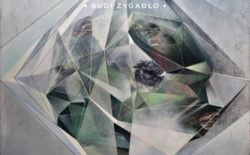Available on: Planet Mu LP
Rudi Zygadlo’s Great Western Laymen formed part of a deluge of auteurish dubstep hybrids released on Planet Mu in 2009/10 (a similar riffing-on-a-theme currently being enacted on the footwork template). The Glaswegian producer always stood out though, his bombastic, vocal-led productions oozing character in a way that could be as appealing to some as it was repulsive to others.
Zygadlo now returns with Tragicomedies, which finds him embracing his status as yet another dubstep refugee – or rather, embracing a newfound freedom from the overbearing zeitgeist, allowing him to explore his own strange corner of the pop cosmos undisturbed by unwieldy genre descriptors, critical expectations etc. At first, I must confess, I didn’t like this record one bit. Its concerns sit so thoroughly beyond the circled wagons of current electronic music endeavour (even for an omnivorous label like Mu) that your initial reaction upon listening is likely to be one of indifference or distaste. But persevere, and you’ll find yourself cottoning on to its intriguing aspects: the wry, campy humour, the intricacy of its construction, and the consistently ingenious way in which it pirouettes from one musical moment to the next.
A few neat ideas solidify into habits: shimmering, Reichian piano figures that tumble restlessly around their harmonic fulcrum (see the exquisite ‘An Introduction’); muscular synth pop gestures that hint at big room ambitions (‘Russian Dolls’); the judicious but surprisingly forthright use of acoustic instruments, dropped unapologetically into an otherwise synthetic soundworld; and Zygadlo’s voice, always stacked up on itself in thick blocks of sound, impossibly deep bass under histrionic falsetto, and harmonised with computerised precision.
The latter two in particular help to foster a sense that it’s the weird that Zygadlo is searching for – those moments of subtle alienation where the familiar reveals itself to be not quite so, and you find yourself smirking, perhaps, or simply drawn deeper into the illogical orbit of a distinctive musical mind. Central to Zygadlo’s working method, then, is the sly probing of the crevice at the centre of the uncanny valley. Take opener ‘Kopernikuss’, a delicate chorale-like miniature whose sincerity is tempered by a piano part that veers squiffily out of tune, part hallucinatory feint, part cheap but satisfying slapstick manoeuvre. Or ‘The Deaf School’, where synth arpeggios are doubled by vocals at a pace and level of precision fractionally beyond human capability.
But of course, this isn’t entirely alien music. At points, acoustic orchestration suggests parallels with contemporary indie operators: the plangent horns of ‘Catharine’ hint at Efterklang, perhaps; ‘Black Rhino’ momentarily evokes Owen Pallett’s multi-tracked violin constructions. The spiked pitfall of twee is circled on occasion – most notably in the surreal doo-wop lilt of ‘Waltz For Daphnis’, glockenspiels and all. But the (over-)familiarities are never allowed to settle, always snatched away to be replaced by the next shiny bauble in Zygadlo’s box of tricks.
This perpetual cycling through of ideas can be fascinating but also fatiguing, and it ultimately marks the record’s most debilitating flaw. Just as Zygadlo’s lyrical themes tend to be tantalisingly but frustratingly half-formed – a primer for some meatier meditation on a theme that never arrives, the seed of an idea whose growth is stunted by the producer’s voracious appetite for newly configured arrangements, minute programming flourishes, subtly weird processing – so too are his hooks often only two thirds of what they could be. As a result, this record doesn’t leave quite the deep impression that its finest moments suggest it ought to. Still, Zygadlo is only two LPs into his career. Tragicomedies can perhaps be viewed as a stepping stone in the direction of pop greatness.

































